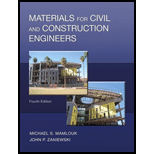
Materials for Civil and Construction Engineers (4th Edition)
4th Edition
ISBN: 9780134320533
Author: Michael S. Mamlouk, John P. Zaniewski
Publisher: PEARSON
expand_more
expand_more
format_list_bulleted
Concept explainers
Question
Chapter 1, Problem 1.49QP
To determine
Write the function of the instrument LVDT in laboratory experiments. Also, show a sketch of the main components of an LVDT and describe its uses.
Expert Solution & Answer
Want to see the full answer?
Check out a sample textbook solution
Students have asked these similar questions
1.0 m
(Eccentricity
in one direction
only)=0.15 m
Call
1.5 m x 1.5m
Centerline
An eccentrically loaded foundation is shown in the figure above. Use FS of 4 and determine the maximum allowable load
that the foundation can carry if y = 18 kN/m³ and ' = 35°. Use Meyerhof's effective area method.
For '=35°, N = 33.30 and Ny = 48.03.
(Enter your answer to three significant figures.)
Qall
=
kN
What are some advantages and disadvantages of using prefabrication in construction to improve efficiency and cut down on delays?
PROBLEM:7–23.
Determine the maximum shear stress acting in the beam at the critical
section where the internal shear force is maximum.
3 kip/ft
ΑΟ
6 ft
DiC
0.75 in.
6 ft
6 in.
1 in.
F
[ 4 in.
C
4 in.
D
6 in.
Fig of prob:7-23
1 in.
6 ft
B
Chapter 1 Solutions
Materials for Civil and Construction Engineers (4th Edition)
Ch. 1 - State three examples of a static load application...Ch. 1 - A material has the stressstrain behavior shown in...Ch. 1 - A tensile load of 50.000 lb is applied to a metal...Ch. 1 - A tensile load of 190 kN is applied to a round...Ch. 1 - A cylinder with a 6.0 in. diameter and 12.0 in....Ch. 1 - A metal rod with 0.5 inch diameter is subjected to...Ch. 1 - A rectangular block of aluminum 30 mm 60 mm 90...Ch. 1 - A plastic cube with a 4 in. 4 in. 4 in. is...Ch. 1 - A material has a stressstrain relationship that...Ch. 1 - On a graph, show the stressstrain relationship...
Ch. 1 - The rectangular block shown in Figure P1.11 is...Ch. 1 - The rectangular metal block shown in Figure P1.11...Ch. 1 - A cylindrical rod with a length of 380 mm and a...Ch. 1 - A cylindrical rod with a radius of 0.3 in. and a...Ch. 1 - A cylindrical rod with a diameter of 15.24 mm and...Ch. 1 - The stressstrain relationship shown in Figure...Ch. 1 - A tension test performed on a metal specimen to...Ch. 1 - An alloy has a yield strength of 41 ksi, a tensile...Ch. 1 - Prob. 1.21QPCh. 1 - Figure P1.22 shows (i) elasticperfectly plastic...Ch. 1 - An elastoplastic material with strain hardening...Ch. 1 - A brace alloy rod having a cross sectional area of...Ch. 1 - A brass alloy rod having a cross sectional area of...Ch. 1 - A copper rod with a diameter of 19 mm, modulus of...Ch. 1 - A copper rod with a diameter of 0.5 in., modulus...Ch. 1 - Define the following material behavior and provide...Ch. 1 - An asphalt concrete cylindrical specimen with a...Ch. 1 - What are the differences between modulus of...Ch. 1 - Prob. 1.33QPCh. 1 - A metal rod having a diameter of 10 mm is...Ch. 1 - What is the factor of safety? On what basis is its...Ch. 1 - Prob. 1.36QPCh. 1 - Prob. 1.37QPCh. 1 - A steel rod, which is free to move, has a length...Ch. 1 - In Problem 1.38, if the rod is snugly fitted...Ch. 1 - A 4-m-long steel plate with a rectangular cross...Ch. 1 - Estimate the tensile strength required to prevent...Ch. 1 - Prob. 1.42QPCh. 1 - Briefly discuss the variability of construction...Ch. 1 - In order to evaluate the properties of a material,...Ch. 1 - A contractor claims that the mean compressive...Ch. 1 - A contractor claims that the mean compressive...Ch. 1 - Prob. 1.47QPCh. 1 - Prob. 1.48QPCh. 1 - Prob. 1.49QPCh. 1 - Briefly discuss the concept behind each of the...Ch. 1 - Referring to the dial gauge shown in Figure P1.51,...Ch. 1 - Repeat Problem 1.51 using the dial gauge shown in...Ch. 1 - Measurements should be reported to the nearest...Ch. 1 - During calibration of an LVDT, the data shown in...Ch. 1 - During calibration of an LVDT, the data shown in...
Knowledge Booster
Learn more about
Need a deep-dive on the concept behind this application? Look no further. Learn more about this topic, civil-engineering and related others by exploring similar questions and additional content below.Similar questions
- 7.60 This abrupt expansion is to be used to dissipate the high-energy flow of water in the 5-ft-diameter penstock. Assume α = 1.0 at all locations. a. What power (in horsepower) is lost through the expansion? b. If the pressure at section 1 is 5 psig, what is the pressure at section 2? c. What force is needed to hold the expansion in place? 5 ft V = 25 ft/s Problem 7.60 (2) 10 ftarrow_forward7.69 Assume that the head loss in the pipe is given by h₁ = 0.014(L/D) (V²/2g), where L is the length of pipe and D is the pipe diameter. Assume α = 1.0 at all locations. a. Determine the discharge of water through this system. b. Draw the HGL and the EGL for the system. c. Locate the point of maximum pressure. d. Locate the point of minimum pressure. e. Calculate the maximum and minimum pressures in the system. Elevation 100 m Water T = 10°C L = 100 m D = 60 cm Elevation 95 m Elevation 100 m L = 400 m D = 60 cm Elevation = 30 m Nozzle 30 cm diameter jet Problem 7.69arrow_forwardA rectangular flume of planed timber (n=0.012) slopes 0.5 ft per 1000 ft. (i)Compute the discharge if the width is 7 ft and the depth of water is 3.5 ft. (ii) What would be thedischarge if the width were 3.5 ft and depth of water is 7 ft? (iii) Which of the two forms wouldhave greater capacity and which would require less lumber?arrow_forward
- Figure shows a tunnel section on the Colorado River Aqueduct. The area of the water cross section is 191 ft 2 , and the wetted perimeter is 39.1 ft. The flow is 1600 cfs. If n=0.013 for the concrete lining, find the slope.arrow_forward7.48 An engineer is making an estimate for a home owner. This owner has a small stream (Q= 1.4 cfs, T = 40°F) that is located at an elevation H = 34 ft above the owner's residence. The owner is proposing to dam the stream, diverting the flow through a pipe (penstock). This flow will spin a hydraulic turbine, which in turn will drive a generator to produce electrical power. Estimate the maximum power in kilowatts that can be generated if there is no head loss and both the turbine and generator are 100% efficient. Also, estimate the power if the head loss is 5.5 ft, the turbine is 70% efficient, and the generator is 90% efficient. Penstock Turbine and generator Problem 7.48arrow_forwarddesign rectangular sections for the beam and loads, and p values shown. Beam weights are not included in the loads given. Show sketches of cross sections including bar sizes, arrangements, and spacing. Assume concrete weighs 23.5 kN/m'. fy= 420 MPa, and f’c= 21 MPa.Show the shear and moment diagrams as wellarrow_forward
- Draw as a 3D object/Isometricarrow_forwardPost-tensioned AASHTO Type II girders are to be used to support a deck with unsupported span equal to 10 meters. Two levels of Grade 250, 10 x 15.2 mm Ø 7-wire strand are used to tension the girders with 5 tendons per level, where the tendons on top stressed before the ones on the bottom. The girder is simply supported at both ends. The anchors are located 100 mm above the neutral axis at the supports while the eccentricity is measured at 400 mm at the midspan. The tendon profile follows a parabolic shape using a rigid metal sheathing. A concrete topping (slab) 130 mm thick is placed above the beam with a total tributary width of 4 meters. Use maximum values for ranges (table values). Assume that the critical section of the beam is at 0.45LDetermine the losses (friction loss, anchorage, elastic shortening, creep, shrinkage, relaxation). Determine the stresses at the top fibers @ critical section before placing a concrete topping, right after stress transfer. Determine the stress at the…arrow_forwardPlease solve this question in hand writting step by step with diagram drawingarrow_forward
arrow_back_ios
SEE MORE QUESTIONS
arrow_forward_ios
Recommended textbooks for you
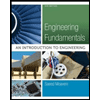 Engineering Fundamentals: An Introduction to Engi...Civil EngineeringISBN:9781305084766Author:Saeed MoaveniPublisher:Cengage Learning
Engineering Fundamentals: An Introduction to Engi...Civil EngineeringISBN:9781305084766Author:Saeed MoaveniPublisher:Cengage Learning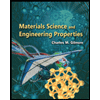 Materials Science And Engineering PropertiesCivil EngineeringISBN:9781111988609Author:Charles GilmorePublisher:Cengage Learning
Materials Science And Engineering PropertiesCivil EngineeringISBN:9781111988609Author:Charles GilmorePublisher:Cengage Learning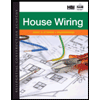 Residential Construction Academy: House Wiring (M...Civil EngineeringISBN:9781285852225Author:Gregory W FletcherPublisher:Cengage Learning
Residential Construction Academy: House Wiring (M...Civil EngineeringISBN:9781285852225Author:Gregory W FletcherPublisher:Cengage Learning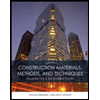 Construction Materials, Methods and Techniques (M...Civil EngineeringISBN:9781305086272Author:William P. Spence, Eva KultermannPublisher:Cengage Learning
Construction Materials, Methods and Techniques (M...Civil EngineeringISBN:9781305086272Author:William P. Spence, Eva KultermannPublisher:Cengage Learning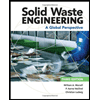 Solid Waste EngineeringCivil EngineeringISBN:9781305635203Author:Worrell, William A.Publisher:Cengage Learning,
Solid Waste EngineeringCivil EngineeringISBN:9781305635203Author:Worrell, William A.Publisher:Cengage Learning,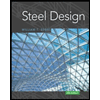 Steel Design (Activate Learning with these NEW ti...Civil EngineeringISBN:9781337094740Author:Segui, William T.Publisher:Cengage Learning
Steel Design (Activate Learning with these NEW ti...Civil EngineeringISBN:9781337094740Author:Segui, William T.Publisher:Cengage Learning

Engineering Fundamentals: An Introduction to Engi...
Civil Engineering
ISBN:9781305084766
Author:Saeed Moaveni
Publisher:Cengage Learning

Materials Science And Engineering Properties
Civil Engineering
ISBN:9781111988609
Author:Charles Gilmore
Publisher:Cengage Learning

Residential Construction Academy: House Wiring (M...
Civil Engineering
ISBN:9781285852225
Author:Gregory W Fletcher
Publisher:Cengage Learning

Construction Materials, Methods and Techniques (M...
Civil Engineering
ISBN:9781305086272
Author:William P. Spence, Eva Kultermann
Publisher:Cengage Learning

Solid Waste Engineering
Civil Engineering
ISBN:9781305635203
Author:Worrell, William A.
Publisher:Cengage Learning,

Steel Design (Activate Learning with these NEW ti...
Civil Engineering
ISBN:9781337094740
Author:Segui, William T.
Publisher:Cengage Learning